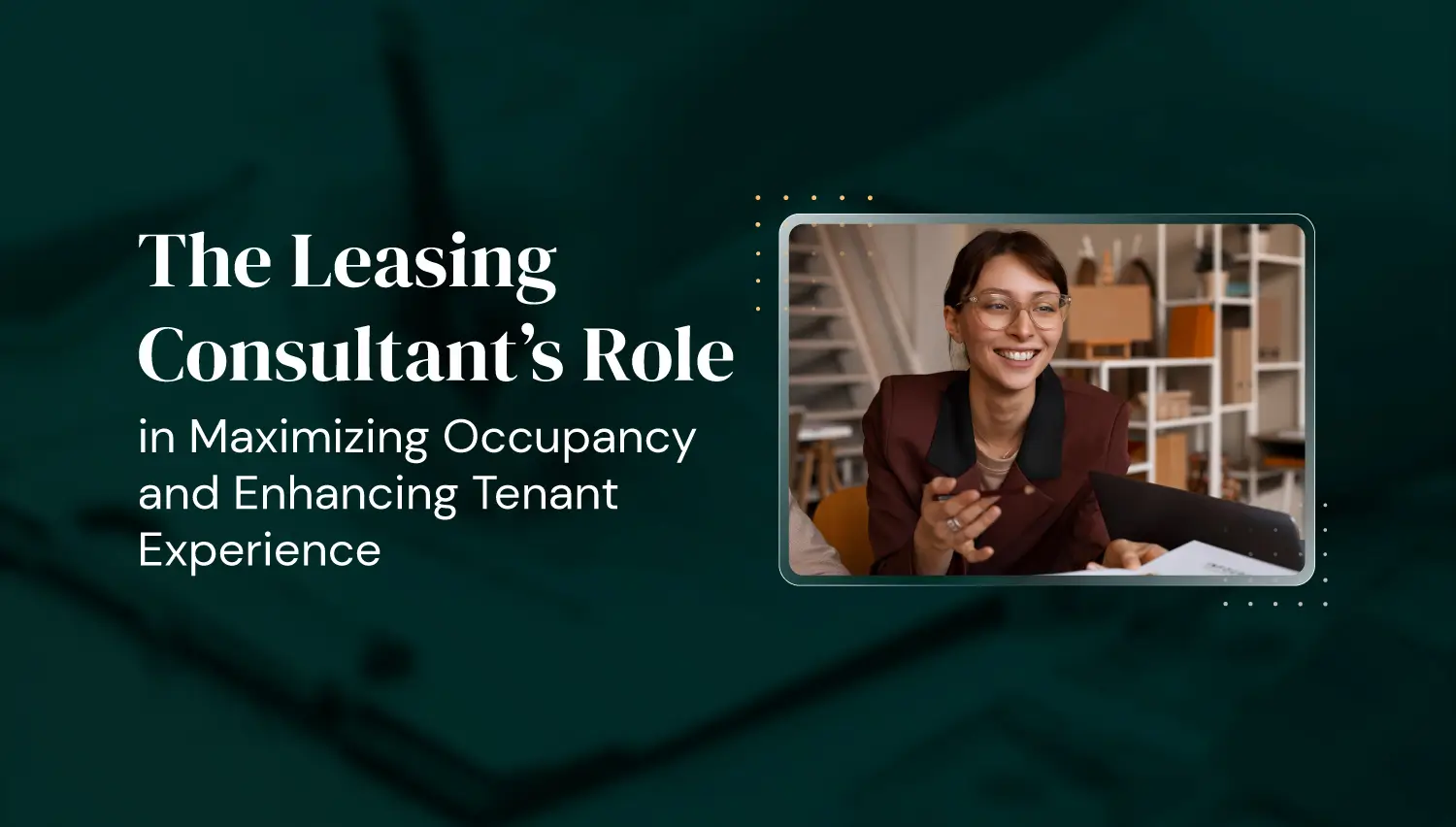A few years ago, I worked with a property group managing several mid-tier apartment complexes sitting at 82% occupancy. The numbers weren’t disastrous, but leadership was frustrated. They had beautiful buildings, competitive rents, and a decent marketing funnel. The gap, as it turned out, wasn’t demand. It was conversion.
When we audited the leasing process, one thing became clear: consultants were juggling everything manually. Missed follow-ups, delayed tour scheduling, outdated listings, and inconsistent communication. No one owned the tenant journey from inquiry to move-in. We restructured the workflow, clarified accountability, and trained consultants to operate as relationship managers rather than just front-line sales reps. Within one quarter, occupancy climbed past 95%, and tenant satisfaction scores followed.
That experience reinforced a lesson I’ve seen across dozens of property teams: a skilled leasing consultant engineers stability. They bridge marketing, operations, and resident experience, ensuring every inquiry, showing, and signature move seamlessly toward higher occupancy and long-term retention.
What a Leasing Consultant Really Does
Respond to Rental Inquiries from Prospective Tenants
Every leasing opportunity starts with a timely, informed response. When a prospective tenant reaches out, whether through a property portal, social media, or a phone call, the leasing consultant’s job is to translate interest into engagement. The best consultants treat inquiries like warm leads: they respond quickly, personalize their communication, and clarify key details (availability, pricing, move-in timelines) without overselling. This is often the moment where trust is either built or lost. In highly competitive markets, even a few hours’ delay can mean a lost lease.
Schedule Property Tours and Follow-Up Calls
Tour scheduling is the consultant’s opportunity to shape perception. A well-timed, well-managed tour shows the property at its best and creates an emotional connection. Skilled leasing consultants plan tours around natural light, reduce back-to-back overlap, and ensure units are staged properly. What happens after the tour is equally critical: timely follow-up calls keep the conversation warm, answer lingering questions, and move the prospect toward application.
Prepare and Send Lease Agreements and Related Documents
Accuracy and speed matter here. Once a tenant decides to move forward, the leasing consultant prepares and delivers the lease documentation. Delays or errors in this stage can erode confidence and slow occupancy turnover. Strong consultants understand local lease requirements, digital signing tools, and the nuances of move-in timing. Their precision reduces friction and helps property managers maintain compliance and cash flow predictability.
Coordinate Credit Checks and Tenant Screenings
Tenant screening is a safeguard for both property owners and existing residents. Leasing consultants coordinate credit checks, employment verification, and background reviews to ensure applicants meet established criteria. Beyond simply running reports, the consultant interprets results and communicates decisions professionally, maintaining fairness and transparency. This process, when handled well, prevents costly turnovers and protects the community’s reputation.
Update Property Listings with Accurate Information
Prospective tenants expect accuracy across every channel they browse. Outdated rent figures or unit descriptions can damage credibility fast. Leasing consultants keep property listings current. Adjusting photos, pricing, and availability in real time. They also monitor listing performance to identify what drives inquiries and what falls flat. This data-driven vigilance directly supports higher lead-to-lease conversion rates.
.webp)
Maintain Communication with Current and Prospective Tenants
A leasing consultant’s communication role extends well beyond new leads. They’re often the first point of contact for current tenants with renewal questions, maintenance concerns, or referral opportunities. Consistent, professional communication across email, text, and in-person interactions strengthens the property’s brand and encourages renewals. When tenants feel heard, they’re far more likely to stay, and to recommend the property to others.
Track Lease Renewals and Notify Tenants in Advance
Proactive renewal management is one of the most overlooked levers in occupancy optimization. Skilled leasing consultants maintain a rolling calendar of lease expirations and start renewal outreach well before notice deadlines. This approach minimizes turnover downtime and gives property managers the runway to plan upgrades or marketing if a unit will vacate. Early communication also gives tenants time to evaluate their options, which builds goodwill and trust.
Resolve Tenant Questions During the Leasing Process
From pet policies to parking logistics, tenant questions can make or break a lease decision. Consultants who anticipate these questions and offer transparent, well-prepared answers create a smoother experience. They act as translators between property management policy and tenant expectations, ensuring no detail falls through the cracks. Quick, confident responses during this stage help turn uncertainty into commitment.
Keep Property Management Systems Updated with Tenant Details
Every piece of tenant data (contact information, lease start date, payment schedule) feeds into broader property performance metrics. Leasing consultants keep these records accurate and updated across CRM and property management systems. Clean data not only prevents administrative errors but also allows managers to track occupancy rates, forecast revenue, and plan maintenance efficiently.
Support Occupancy Goals by Ensuring Fast Turnaround on Leases
The ultimate measure of leasing success is occupancy. Consultants who manage their pipeline efficiently (responding fast, following up consistently, and closing leases promptly) reduce vacancy loss and stabilize revenue. Beyond the paperwork, they understand that speed means precision under pressure. Each well-executed step in their workflow compounds into a faster, more profitable leasing cycle.
How Leasing Consultants Elevate the Tenant Experience
The leasing process doesn’t end when the paperwork is signed. It evolves into the day-to-day experience that determines whether tenants renew or move on. A skilled leasing consultant understands that every conversation, maintenance request, and renewal touchpoint is part of a larger customer lifecycle. Their ability to foster trust and consistency translates directly into tenant satisfaction, retention, and brand reputation.
Turning Move-Ins Into Lasting Impressions
Move-in day sets the tone for the entire tenancy. Great leasing consultants make sure the transition feels personal and seamless. That can mean confirming utilities are set up, ensuring the unit is spotless, or greeting new tenants in person to walk through essentials. Small touches, like a quick follow-up message after the first week, signal attentiveness and care. Those gestures might seem minor, but they often determine whether a tenant feels like a valued resident or just another lease.
Maintaining Connection Throughout the Lease Term
Once tenants settle in, the leasing consultant becomes a steady point of contact for questions, updates, and general communication. They act as a liaison between residents and property management, helping resolve minor issues before they become frustrations. Whether it’s clarifying maintenance timelines or providing renewal reminders, consistency builds credibility. Over time, that proactive communication creates a community atmosphere that drives retention and referrals alike.
Supporting Renewals Through Relationships
Renewals are one of the strongest indicators of tenant satisfaction and one of the most reliable levers for maximizing occupancy. Consultants who maintain genuine relationships with residents rarely have to “sell” renewals. They’ve already built trust through responsiveness and reliability. When renewal season arrives, they focus on confirming satisfaction, offering clear information about lease options, and addressing concerns early. That combination of empathy and structure can reduce turnover dramatically.
Gathering Insight to Improve Property Operations
Leasing consultants sit at the intersection of tenant feedback and operational execution. They hear what residents love and what consistently causes friction. By capturing and communicating these insights, consultants give property managers data that can inform decisions about amenities, maintenance priorities, or pricing strategies. In well-run properties, this feedback loop is one of the quiet engines of improvement.
Strengthening Brand Reputation Through Tenant Advocacy
In competitive markets, reputation is currency. Leasing consultants are often the face of the brand, and how they interact with tenants influences everything from online reviews to referral pipelines. Consultants who treat every interaction as a customer service moment, not a transaction, help turn satisfied tenants into advocates. That advocacy (organic reviews, word-of-mouth referrals, positive community sentiment) becomes a long-term asset that drives inquiries without additional advertising spend.
.webp)
Setting Leasing Consultants Up for Success
High-performing leasing consultants are backed by structure. Property management teams that invest in the right systems, training, and feedback mechanisms turn the role from administrative to strategic. When consultants have clarity and support, they move faster, close stronger, and create better tenant experiences across the board.
Establish Clear Performance Metrics
Leasing success should be measurable, not subjective. The best-performing teams track a mix of quantitative and qualitative metrics: inquiry response time, lead-to-lease conversion rates, average days on market, and renewal percentages. When these KPIs are visible and tied to clear incentives, consultants stay focused on outcomes that directly impact occupancy and revenue.
Provide Consistent Training and Role Clarity
Too often, leasing consultants are handed a desk, a CRM login, and a list of units and are expected to figure it out. Structured onboarding and role-specific training make the difference between a transactional employee and a confident brand representative. Ongoing coaching on negotiation skills, tenant communication, and fair housing compliance keeps performance consistent and risk low.
Equip Teams with the Right Tools
Speed and accuracy depend on technology. Centralized property management platforms, automated follow-up workflows, and integrated credit screening systems allow consultants to handle more leads without losing quality. Even simple automations – like triggered renewal reminders or digital lease templates – can free up hours each week. The less time consultants spend on admin, the more time they can spend building relationships that drive occupancy.
Align Leasing with Marketing and Maintenance
Leasing consultants often sit at the crossroads of multiple functions: marketing generates leads, maintenance delivers the experience, and property management oversees operations. When those teams operate in silos, occupancy suffers. Regular cross-department check-ins help consultants share feedback from tenants and prospects that marketing can use to refine messaging or maintenance can use to prioritize fixes. That collaboration ensures that what’s promised in listings aligns with what’s delivered on site.
Recognize and Retain Top Leasing Talent
In competitive rental markets, strong leasing consultants are hard to replace. Recognizing their impact through compensation, advancement opportunities, or visible acknowledgment builds loyalty and continuity. A consultant who feels valued is far more likely to stay invested in their property’s long-term success. And given how much tenant satisfaction hinges on personal connection, retention in this role directly influences the property’s performance metrics.
Building the Team That Keeps Occupancy High
When a property consistently meets its occupancy goals, it’s rarely just about pricing or location. It’s about people. Skilled leasing consultants convert inquiries into relationships and turn residents into long-term advocates. But finding that caliber of talent takes intention.
That’s where a recruitment partner like Somewhere adds real value. We help property management teams identify, hire, and retain leasing professionals who understand both the business metrics and the human side of tenant experience.
If you’re ready to strengthen your leasing function with people who move fast, communicate clearly, and elevate your brand reputation, fill out the contact form below to start the conversation.














